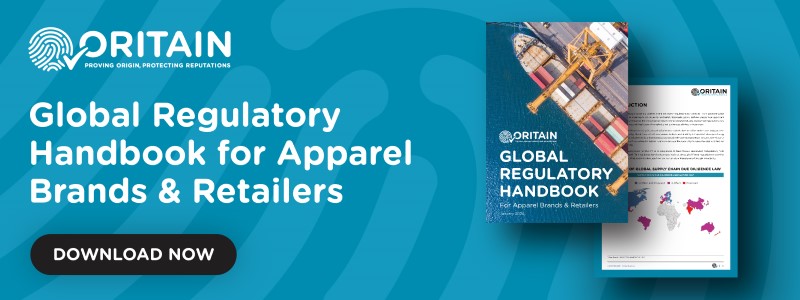Recent DHS Hearing Signals Tougher UFLPA Enforcement
By Ana Hinojosa | 7 February 2024
minutes to read.

The fashion and textile industry can expect a flurry of activity in the coming months as the recent House Homeland Security Subcommittee hearing signals tougher enforcement of the Uyghur Forced Labor Prevention Act (UFLPA). The hearing, held on January 11, 2024, comes after a previous hearing in October 2023 where experts and industry representatives raised concerns about the continued use of forced labor in supply chains.
Although the UFLPA was signed into law in June 2022, there have been ongoing discussions about the need for more robust enforcement measures to prevent goods produced using forced labor from entering the United States market. Some of the key challenges include:
Supply chain obscurity
Fashion and textile companies often do not have a clear understanding of their supply chains beyond their direct suppliers, making it difficult for U.S. Customs and Border Protection (CBP) to track the origin of materials and labor used.
Increase in de minimis shipments
De minimis shipments doubled over the last five years, with more than 1 billion shipments entering the U.S. in the 2023 fiscal year.
More textile shipments
The total annual import value of textiles and apparel exceeds over $50 billion. Since the UFLPA came into effect, CBP detained more than $46 million worth of apparel, textile, and footwear imports on suspicion of UFLPA violations. Fashion goods, not limited to cotton, account for 17% of scrutinized shipments.
Non-compliance and penalties
Of all halted shipments, about 63% were denied entry due to non-compliance. In the 2023 fiscal year, CBP seized over 5,000 textile shipments and issued around $19 million in commercial fraud penalties, not related to UFLPA. Some stakeholders are clamoring for more.
Limited scale of UFLPA entity list
The UFLPA entity list initially included 20 entities suspected of using forced labor, but only 10 have been added since June 2022.
Evasion tactics
Transshipments, where products are shipped through other countries to disguise their origin, mixing forced labor inputs with clean inputs, and misrepresenting the origin of products were identified as some of the tactics commonly used by companies to evade UFLPA regulations.
CBP's Plans for Tougher Forced Labor Enforcement
During the hearing, CBP stated its plans for stricter enforcement of UFLPA regulations. The agency has been actively working to identify high-risk shipments and target them for inspection and verification. Their strategy includes:
Scaling up isotopic testing
Finding success in tracing the geographic origins of cotton, CBP has established a dedicated isotopic testing lab in Savannah, Georgia, with plans for further expansions in New York City and Los Angeles in the next six to eight months. They are also educating and training field officers and import specialists on this technology, enabling them to identify and test relevant shipments.
Technology and personnel investments
CBP is investing in personnel training, outreach, and laboratory science technology to enhance their analytical and threat detection capabilities. This includes the development and deployment of advanced trade analytic models to identify entities with potential ties to forced labor operations.
Stronger collaboration for global enforcement
Recognizing the global nature of supply chains, CBP is working closely with other U.S. agencies and international partners to share intelligence and develop strategies to address challenges, including regulatory changes and technological advancements.
Expanding the entity list
A dedicated team, solely devoted to the development and administration of the entity list, has been established to identify foreign entities and individuals involved in human rights violations and forced labor practices. This team is responsible for conducting a strategic review to improve the process, with a focus on transparency, consistency, and scalability.
Tackling de minimis shipments
CBP discussed enhancing their targeting and risk assessment capabilities to address smaller, de minimis shipments with limited data. Pilot programs have been initiated to better understand the parties involved, contents, and customers of these shipments.
What This Means for Fashion and Retail Businesses
Tougher days are on the horizon for fashion and retail businesses involved in importing goods and materials from countries with known human rights abuses and forced labor practices. With CBP's increased focus on supply chain transparency and its enhanced capabilities to identify entities involved in these practices, it is crucial for businesses to be even more diligent in their sourcing and due diligence processes.
1. Increased due diligence
Businesses are required to conduct thorough and in-depth audits of their entire supply chain to make sure that no part of their production process is involved in or tainted by forced labor practices. The audit must cover every tier of the supply chain, including suppliers, subcontractors, and even raw material providers, and must be conducted regularly to ensure ongoing compliance.
2. Risk of penalties and negative publicity
CBP has the authority to issue expensive penalties and seize goods suspected of being produced with forced labor - even if the goods were not knowingly imported. The risk of legal action extends beyond financial penalties, as the reputational damage and potential loss of business can be difficult to recover from.
3. Need for supply chain transparency
CBP has made it clear that they will not tolerate any lack of transparency in supply chains. Businesses must be open and honest about their sourcing practices, providing all necessary documentation such as detailed records of suppliers and materials and audit reports to CBP upon request.
4. Third-party verification
As highlighted in the hearing, the private sector, particularly in the textile industry, is actively leveraging isotopic testing at spinning stage where raw materials are processed, and in the production of textiles and garments. Partnering with third-party testing services like Oritain can provide authentic and independent verification of the geographic origin of raw materials, ensuring they are not produced with forced labor.
Learn more about how your business can prepare for the UFLPA or get in touch with us today to find out how isotopic testing can support your supply chain transparency efforts.
Disclaimer: The information provided in this document does not and is not intended to constitute legal advice. Instead, all information presented here is for general informational purposes only. Counsel should be consulted with respect to any particular legal situation.

